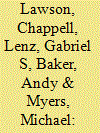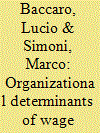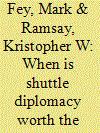|
|
|
Sort Order |
|
|
|
Items / Page
|
|
|
|
|
|
|
| Srl | Item |
| 1 |
ID:
100616


|
|
|
|
|
| Publication |
2010.
|
| Summary/Abstract |
A flurry of recent studies indicates that candidates who simply look more capable or attractive are more likely to win elections. In this article, the authors investigate whether voters' snap judgments of appearance travel across cultures and whether they influence elections in new democracies. They show unlabeled, black-and-white pictures of Mexican and Brazilian candidates' faces to subjects living in America and India, asking them which candidates would be better elected officials. Despite cultural, ethnic, and racial differences, Americans and Indians agree about which candidates are superficially appealing (correlations ranging from .70 to .87). Moreover, these superficial judgments appear to have a profound influence on Mexican and Brazilian voters, as the American and Indian judgments predict actual election returns with surprising accuracy. These effects, the results also suggest, may depend on the rules of the electoral game, with institutions exacerbating or mitigating the effects of appearance.
|
|
|
|
|
|
|
|
|
|
|
|
|
|
|
|
| 2 |
ID:
100621


|
|
|
|
|
| Publication |
2010.
|
| Summary/Abstract |
The study draws on evidence from South Asia to explore how union partisan ties condition industrial protest in the context of rapid economic change. It argues that unions controlled by major political parties respond to the economic challenges of the postreform period by facilitating institutionalized grievance resolution and encouraging restraint in the collective bargaining arena. By contrast, politically independent unions and those controlled by small parties are more likely to ratchet up militancy and engage in extreme or violent forms of protest. The difference between the protest behavior of major party unions and other types of unions is explained by the fact that major political parties are encompassing organizations that internalize the externalities associated with the protest of their affiliated unions. Using original survey data from four regions in South Asia, the study shows that party encompassment is a better predictor of worker protest than other features of the affiliated party or the union, including whether the party is in or out of power, the ideological orientation of the party, or the degree of union encompassment. The analysis has implications for the policy debate over whether successful economic reform is contingent upon the political exclusion or repression of organized labor.
|
|
|
|
|
|
|
|
|
|
|
|
|
|
|
|
| 3 |
ID:
100618


|
|
|
|
|
| Publication |
2010.
|
| Summary/Abstract |
This article contributes to the political economic literature regarding the effects of industrial relations institutions on national economic outcomes. Based on an econometric analysis of the determinants of wage moderation in sixteen industrialized countries between 1974 and 2000, it argues that the organizational characteristics of trade unions have a significant impact on wage dynamics. Controlling for a number of institutional and economic factors, the countries in which trade union confederations directly involve workers in the process of collective bargaining ratification have on average lower wage growth relative to productivity than others. The authors also find that collective bargaining coordination and contract ratification magnify each other's wage-dampening effect. Through case studies of Ireland and Italy, the article examines the causal mechanisms underlying the uncovered statistical regularities and concludes that, particularly at a time in which classic political exchange is waning, worker involvement in contract ratification allows confederation leaders to resolve conflicting claims inside their organizations at lower wage levels than are achieved by a less participatory governance process.
|
|
|
|
|
|
|
|
|
|
|
|
|
|
|
|
| 4 |
ID:
100619


|
|
|
|
|
| Publication |
2010.
|
| Summary/Abstract |
Existing theories of change in campaign strategies predict cross-national convergence in candidates' linkages to voters and the degree of policy focus and cleavage priming in their appeals. However, the prevailing national patterns of electioneering in Chile, Brazil, and Peru have actually diverged from one another since their transitions from authoritarian rule. Based upon content analysis of television advertising, interviews with campaign staff, and case studies of specific elections in these three countries, this article develops a theory of success contagionthat can explain the evolution of presidential campaign strategy in third-wave democracies. The author argues that the first politician to combine a victorious campaign with a successful term as president establishes a model of electioneering that candidates across the ideological spectrum are likely to adopt in the future. Such contagion can occur directly, through politicians' imitation of each other's strategies, or indirectly, with communities of campaign professionals playing an intermediary role. Strategic convergence is less likely in cases of repeatedly poor governing performance. Instead, candidates tend to choose strategies through an inward-oriented process of reacting against previous errors. Initial testing suggests the theory is generalizable to other new democracies with at least moderate organizational continuity across elections.
|
|
|
|
|
|
|
|
|
|
|
|
|
|
|
|
| 5 |
ID:
100615


|
|
|
|
|
| Publication |
2010.
|
| Summary/Abstract |
The authors study the conflict mediation problem, sometimes called "shuttle diplomacy," when the mediator acts as a go-between and must gather information from the disputants. In the context of a general model of information mediation, they show that the incentive that disputants have to lie to the mediator undoes any advantage that might be gained by adding communication with a third party. In fact, the main result shows that any equilibrium outcome that is achievable through mediation is also achievable as an equilibrium outcome of a game with unmediated preplay communication. This is true even when the mediator is allowed to have arbitrary preferences or biases. The authors then test their empirical prediction on dispute management efforts between 1937 and 1985. The analysis supports the hypothesis that information mediation has no effect in environments where the mediator has no independent source of information.
|
|
|
|
|
|
|
|
|
|
|
|
|
|
|
|
|
|
|
|
|